Member updates
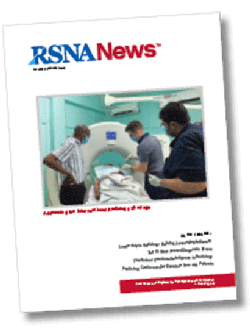
RSNA News Reduces Print Frequency
Starting with this issue, RSNA News will transition to a new print schedule, publishing six print editions each year in January, March, May, July, September and November. This change reflects RSNA’s commitment to sustainability and reducing our environmental impact while continuing to deliver timely, high-quality content to our readers.
Readers will continue to enjoy full access to monthly content and exclusive online articles.
By reducing the number of print issues, RSNA is helping conserve natural resources while maintaining a robust mix of print and digital content. We appreciate your support as we take this step toward a more sustainable future.
We’re committed to keeping you informed with the latest news, research and insights—whether in print or online. Explore even more content and stay connected between issues.
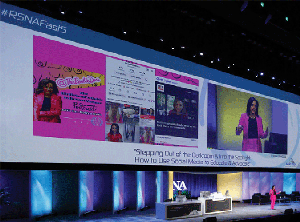
Fast 5 Voting Opens July 7
It’s time to cast your vote to help choose the lineup for Fast 5 at RSNA 2025.
The Fast 5 is a popular annual meeting session featuring five speakers each speaking for five minutes on non-clinical topics. All prospective speakers were asked to incorporate the RSNA 2025 theme: Imaging the Individual.
What thought-provoking insights will our speakers bring to the Arie Crown stage? View the submissions and cast your vote on RSNA social media channels.
After you vote, don’t forget to share the link on social media using #RSNAFast5 to encourage your colleagues to vote by July 21.
Reimagining AI in Barcelona
Join global leaders in radiology and AI for a new RSNA Spotlight Course Radiology Reimagined: Advancing Clinical Practice Through AI Innovation. This two-day experience brings together global leaders in radiology and AI to explore the real-world application of AI tools across diverse practice settings.
Gain a deeper understanding of the AI evaluation and deployment lifecycle, and examine the role of generative AI. Through didactic sessions, case-based learning and interactive discussions, you’ll leave prepared to lead evidence-based implementation and champion innovations that improve both patient outcomes and professional practice.
And, when the session ends, Barcelona awaits. Enjoy the incredible architecture, lively culture and world class cuisine of Northeastern Spain. The course takes place Oct. 16-17—learn more now.
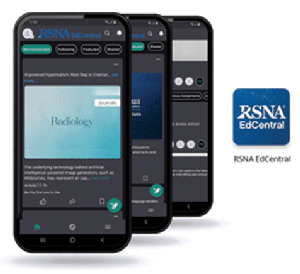
Don’t Miss the MSK Live Case Review on EdCentral
Join Atul K. Taneja, MD, PhD, July 23 at 9 a.m. CT for the July Live Case Review, exclusively on EdCentral. Explore three intriguing musculoskeletal radiology cases in this quick 15-minute session. Register in advance by navigating to the On The Case channel on the platform and locating the event SmartCard.
EdCentral is available only to RSNA members with Standard or Full Access membership. Learn more and register for the Live Case Review.

Explore, Share and Grow in 3D Printing
Connect with innovators shaping the future of medical 3D printing. Learn more and see how you can get involved.
Apply for a Grant
Join the 3D SIG Members are invited to apply for the 3D SIG Research Grant, a seed grant supporting investigator-initiated research in medical immersive imaging, including 3D printing, augmented reality and virtual reality. This funding opportunity is designed to help you advance your research and contribute to the growth of this dynamic specialty. Joining the RSNA 3D Printing SIG connects you to a vibrant community passionate about advancing 3D printing in medical imaging. Enhance your RSNA membership by gaining access to valuable resources, mentorship and opportunities to lead in this rapidly evolving space.
RSNA 2025 Showcase
The 3D SIG Showcase at RSNA 2025 gives you the opportunity to display your 3D printed anatomical models and guides. Come share your creative process and discuss technical challenges and solutions with peers from around the world. Whether you’re a seasoned expert or new to the field, the Showcase offers a collaborative space to exchange insights, build connections and inspire innovation.
Explore New Features in the RSNA Course Catalog
The RSNA Course Catalog has been upgraded to streamline your learning experience and help you make the most of your time. Enjoy a redesigned interface and improved mobile navigation for seamless access to quality course content.
In addition to easier access, you’ll find features that enhance how you engage with learning materials. All videos in the catalog now include closed captioning, and new archive features let you revisit course content even after expiration.
And, if you’re looking for a focused selection of courses, explore RSNA Pro Packs—curated content bundled to accelerate your expertise. Plus, our enhanced webinar experience offers integrated registration, live streaming, easy credit claiming and on-demand access all in one convenient place.
Whether you’re at your desk or on the go, continuing education is now more powerful and accessible than ever before. Learn more now.

Brain Aneurysm AI Challenge Planned
Get your models ready! The new RSNA AI Challenge focused on saccular aneurysms in the brain launches mid-July.
Organized by a task force comprised of RSNA member neuroradiologists and AI experts, the upcoming challenge will task researchers to develop best-in-class machine learning models to detect and classify brain aneurysms.
A specially curated dataset is planned and will contain data from institutions on almost every continent. Two main challenge phases will include training and evaluation. Learn more now.
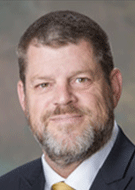
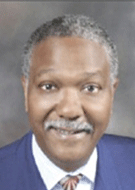
Swan Elected ACR President
The American College of Radiology (ACR) elected Timothy L. Swan, MD, as president during ACR 2025 held in Washington D.C. Dr. Swan is a diagnostic and vascular radiologist at Marshfield Medical Center in Wisconsin. Johnson B. Lightfoote, MD, MBA, was elected vice-president.

Baumgarten to Lead ARRS
Deborah A. Baumgarten, MD, MPH, was installed as president of the American Roentgen Ray Society (ARRS). Dr. Baumgarten is a diagnostic radiologist Baumgarten specializing in abdominal imaging at Mayo Clinic Florida in Jacksonville.

Raising the Voice of Radiology
Every day, RSNA’s media relations team works behind the scenes to spotlight the transformative work of radiologists around the world.
Through a robust press program, RSNA connects journalists with the latest breakthroughs in medical imaging, offers access to expert voices and provides public service announcements that highlight the critical role radiologists play in patient care.
These efforts not only inform global audiences, they amplify the impact of RSNA members by bringing their work to the forefront of public and professional conversations. By promoting research, facilitating interviews and shaping media narratives, RSNA helps ensure that radiologists are RSNA MEMBER SPOTLIGHT recognized as essential partners in the health care continuum.
This valuable program is just one way RSNA supports and elevates its members, reinforcing our shared mission to advance radiology and improve patient outcomes worldwide. Learn more now.